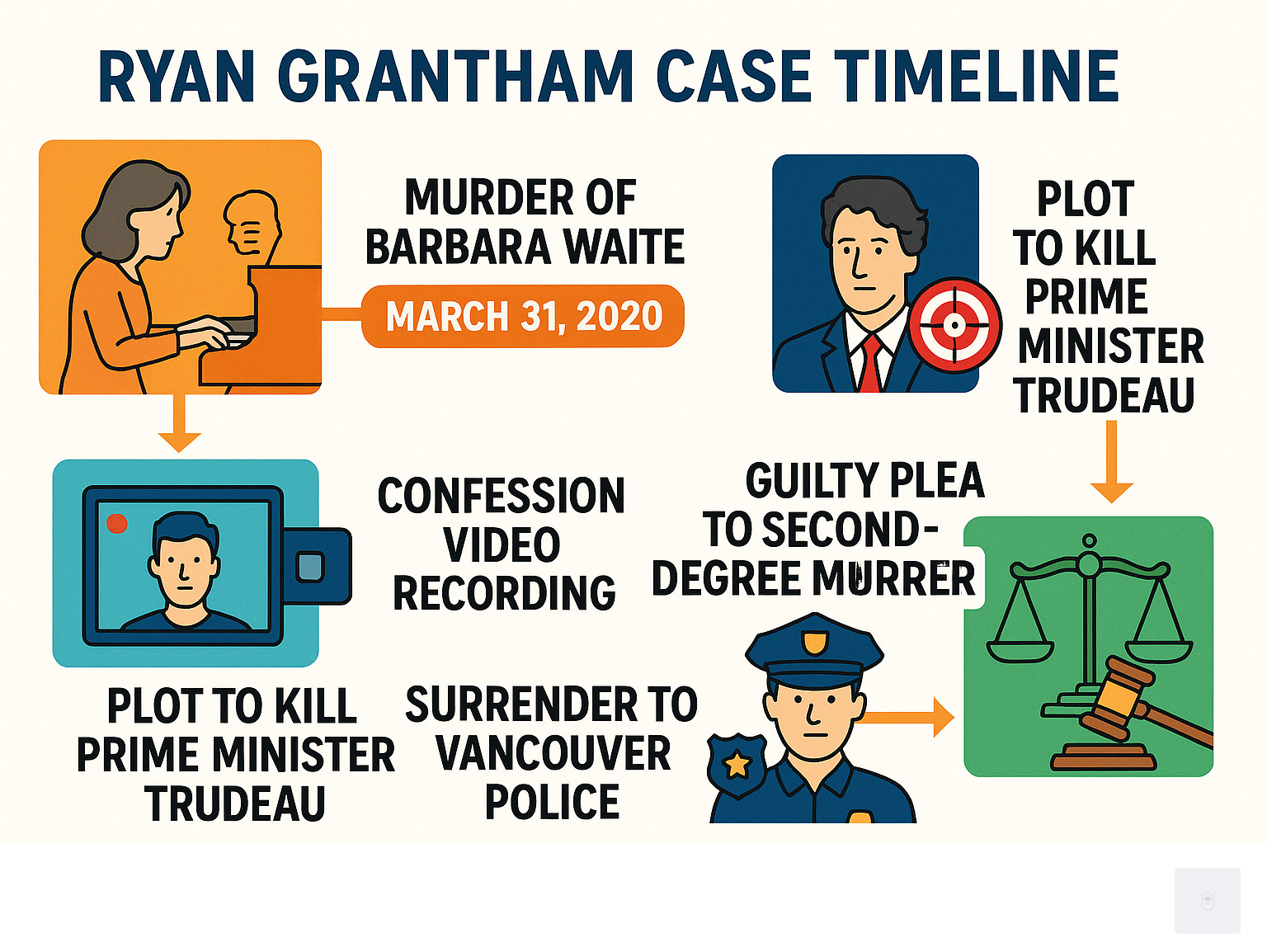
From Promising Child Actor to Convicted Murderer
Ryan Grantham is a former Canadian child actor who was sentenced to life in prison for murdering his mother, Barbara Waite, in March 2020. Once known for roles in popular TV shows and films, his story took a shocking turn that captivated international media attention.

Key Facts About Ryan Grantham:
- Born: November 30, 1998 in Canada
- Acting Career: Started at age 9, appeared in Riverdale, Supernatural, Diary of a Wimpy Kid
- Crime: Shot his mother Barbara Waite in the head while she played piano on March 31, 2020
- Sentence: Life in prison with no parole eligibility for 14 years
- Additional Plans: Plotted to assassinate Canadian Prime Minister Justin Trudeau
- Current Status: Incarcerated after pleading guilty to second-degree murder
Grantham’s case represents one of the most disturbing falls from grace in recent entertainment history. What began as a promising acting career – with credits spanning from Terry Gilliam’s The Imaginarium of Doctor Parnassus to hit series like Riverdale – ended with a life sentence for matricide and plans for mass violence.
The young actor’s descent into violence shocked both the entertainment industry and the public. His confession, filmed on a GoPro camera, and his subsequent plans to kill Canada’s Prime Minister revealed the depth of his mental health crisis and criminal intentions.
As R. Couri Hay, I’ve covered countless stories involving public figures and crisis management throughout my decades in entertainment journalism and publicity here in New York City. The Ryan Grantham case stands as a particularly tragic example of how mental health struggles can devastate not just careers, but entire families and communities. This comprehensive guide examines the timeline, legal proceedings, and lasting impact of this shocking crime.

Also read:
A Promising Start in Hollywood
Before the tragic events that led to his conviction, Ryan Grantham was known as a promising young actor with a career that began at the tender age of nine. His credits spanned both film and television, earning him recognition in the Canadian acting scene and beyond. We remember him from various roles, showcasing a talent that seemed destined for a bright future.
His acting journey started in 2007 with the TV movie The Secret of the Nutcracker. Over the years, he built an impressive filmography, appearing in a diverse range of projects. Notable among these were his appearances in hit television series like Supernatural and iZombie, where he often played guest or recurring roles that left an impression. In 2019, he took on the role of Jeffery Augustine in a single episode of The CW’s popular teen drama Riverdale, a credit that would later gain significant media attention due to his crime.
On the big screen, Ryan Grantham garnered attention for his role as Rodney James in the 2010 film adaptation of Diary of a Wimpy Kid. He also had a part in the critically acclaimed 2009 fantasy film The Imaginarium of Doctor Parnassus, working alongside established Hollywood names. Other film credits include Becoming Redwood (2012), where he played the titular character, and Barricade (2012). His work demonstrated a range that hinted at a long and successful career.
Here is a list of some of Ryan Grantham‘s notable roles, reflecting his early dedication to the craft:
- Riverdale (TV Series) – Jeffery Augustine
- Diary of a Wimpy Kid (Film) – Rodney James
- Supernatural (TV Series) – Hunter Boy #1 / Todd
- iZombie (TV Series) – Full Auto
- The Imaginarium of Doctor Parnassus (Film) – Little Anton
- Becoming Redwood (Film) – Redwood
- The Carpenter’s Miracle (TV Movie) – Luke Quinn
- The 12 Disasters of Christmas (TV Movie) – Peter
- Barricade (Film) – Jake Shade
- Perfect High (TV Movie) – Robbie Walker
- Unspeakable (TV Series) – Andy Girard
- Undercover Cheerleader (TV Movie) – Max
His career was a testament to his talent and hard work, starting at such a young age. For those in the entertainment industry, managing a public image is paramount, and it’s a service we understand deeply. More info about R. Couri Hay Columns publicity services
The Shocking Crime: The Murder of Barbara Waite
The promising trajectory of Ryan Grantham‘s acting career came to a horrifying halt on March 31, 2020. On this fateful day, he committed an act of unspeakable violence, murdering his own mother, Barbara Waite, in their Squamish, British Columbia townhouse. This was not a crime of passion or a sudden outburst; evidence presented in court painted a chilling picture of premeditation.
As his mother played the piano, an activity she often enjoyed, Ryan Grantham approached her from behind and shot her in the back of the head with a .22 rifle. The act was cold and calculated, a profound breach of the trust inherent in the mother-son relationship. We can only imagine the shock and devastation this event brought upon their family and community.
After the murder, Grantham covered his mother’s body with a sheet, placed lit candles around it, and hung a rosary from the piano, a disturbing tableau described in court. This macabre scene underscores the profound psychological turmoil he was experiencing at the time. The details of the crime were carefully documented by Grantham himself, adding another layer of chilling insight into his state of mind.
The Disturbing Aftermath and Confession

What happened after Barbara Waite’s murder was perhaps even more disturbing than the crime itself. Ryan Grantham didn’t simply flee or hide. Instead, he methodically prepared for something far worse – a plan that would have shocked even those of us in New York City who have covered countless celebrity scandals and dark turns in public figures’ lives.
The young actor’s behavior in the hours following his mother’s death revealed a mind that had completely disconnected from reality. His actions were calculated yet ultimately self-defeating, showing both the depth of his mental crisis and a strange flicker of conscience that would later save lives.
A Chilling Confession and Darker Intentions
In what can only be described as a deeply disturbing act, Ryan Grantham pulled out a GoPro camera shortly after killing his mother. He filmed himself confessing to the murder, even showing his mother’s lifeless body on camera. This wasn’t a moment of panic or confusion – it was deliberate documentation of his crime.
But the confession video was just the beginning. Court records revealed that Grantham had been planning something far more terrifying. His target was none other than Canadian Prime Minister Justin Trudeau. This wasn’t some vague threat or passing thought – he had mapped out detailed directions to Rideau Cottage, the Prime Minister’s official residence in Ottawa.
The preparation was methodical and frightening. Grantham loaded his car with three guns, ammunition, and twelve Molotov cocktails. He packed camping supplies, suggesting he planned to stake out his target. The level of planning showed this wasn’t an impulsive decision but a carefully orchestrated assassination plot.
As someone who has spent decades in the media world covering high-profile figures and their security concerns, I can tell you that this type of detailed planning represents one of the most serious threats law enforcement faces.
The Road to Surrender
After committing the murder, Ryan Grantham began driving east from Squamish toward Hope, British Columbia – a journey of roughly 200 kilometers that would become a crucial turning point in preventing further tragedy.
During this drive, his already dark intentions took an even more sinister turn. Court documents revealed that he began considering mass violence at public locations. He thought about attacking the Lions Gate Bridge in Vancouver or targeting Simon Fraser University, where he had previously been a student.
The thought of what could have happened at these busy public places is chilling. Having covered tragedies in New York City and beyond, we know how quickly these situations can spiral into unimaginable loss of life.
But something changed during that drive to Hope. Perhaps it was exhaustion, or maybe some part of his conscience finally broke through. Instead of continuing toward Ottawa or turning back to Vancouver for his mass violence plans, Grantham made a decision that would save countless lives.
He drove straight to the Vancouver Police Department and turned himself in. He confessed to murdering his mother and revealed his plans for further violence. This moment of surrender, while it couldn’t undo the tragedy he had already caused, prevented what could have been a much larger catastrophe.
This act of surrender would later be considered a significant mitigating factor in his sentencing – a small mercy in an otherwise devastating case.
Inside the Mind of Ryan Grantham
To understand how a promising young actor could commit such a horrific act, we need to look inside Ryan Grantham‘s troubled mind. The court proceedings revealed a deeply disturbed individual wrestling with severe mental health challenges that had been building for months before the tragedy.
As someone who has covered countless stories in New York City’s entertainment circles, I’ve witnessed how mental health struggles can hide behind public personas. But Grantham’s case represents something far darker – a complete psychological breakdown that ended in unthinkable violence.
A Downward Spiral of Depression
The months leading up to March 31, 2020, painted a picture of a young man in crisis. Ryan Grantham was experiencing what psychiatric experts described as an intense period of clinical depression, accompanied by crushing anxiety and overwhelming self-loathing. These weren’t just typical struggles – they had evolved into dangerous suicidal ideations and, most alarmingly, homicidal urges.
His daily life reflected this mental deterioration. Grantham had become increasingly isolated, cutting himself off from friends and family. He spent his days smoking cannabis and watching violent videos online, feeding a mind already consumed by dark thoughts. The promising actor had also dropped out of Simon Fraser University, abandoning his education as his world grew smaller and darker.
This wasn’t a sudden break from reality. Court documents revealed that Grantham’s mental health had been declining steadily, creating a perfect storm of psychological distress. Details from the court hearing showed just how deeply troubled he had become.
The Stated Motive: Sparing His Mother
Perhaps the most chilling aspect of Ryan Grantham‘s confession was his twisted reasoning for the murder. According to psychiatric reports and his own statements, Grantham claimed he killed Barbara Waite not out of hatred, but to spare his mother from witnessing the violence he planned to commit afterward.
In his severely disturbed mind, murdering his mother was an act of mercy. He believed that by ending her life, he was preventing her from witnessing his planned assassination of Prime Minister Justin Trudeau and other violent acts. This warped logic reveals the depth of his psychological break from reality.
The court heard testimony that Grantham genuinely believed he was protecting his mother from the horror of seeing her son become a mass murderer. This stated rationale became a crucial element in understanding the crime – not as an act of rage against his mother, but as the product of a mind so fractured that murder seemed like kindness.
This disturbing motivation highlights how mental health crises can distort reality beyond recognition, turning love into violence and protection into destruction.
Justice Served: The Trial and Sentencing

The wheels of justice turned steadily after Ryan Grantham‘s arrest, leading to legal proceedings that would determine his fate. Unlike the glamorous courtroom dramas we often see in Hollywood films – the kind of entertainment stories we might typically cover here at R. Couri Hay Columns from our New York City offices – this real-life case carried the weight of genuine tragedy and loss.
The former child actor’s journey through the Canadian legal system drew international attention, not just for his previous fame, but for the shocking nature of his crime and the disturbing details that emerged during proceedings.
The Second-Degree Murder Conviction of Ryan Grantham
When Ryan Grantham appeared before the British Columbia Supreme Court, he made the decision to plead guilty to second-degree murder. This plea meant accepting responsibility for his actions while avoiding a lengthy trial that would have put his family through additional trauma.
Under Canadian law, a second-degree murder conviction carries an automatic life sentence. The critical question for Justice Kathleen Ker wasn’t whether Grantham would spend life in prison – that was already decided. Instead, the court needed to determine how long he would remain behind bars before becoming eligible for parole.
For second-degree murder, this parole ineligibility period can range anywhere from 10 to 25 years. The court had to weigh numerous factors: the brutality of the crime, the planning involved, Grantham’s mental state, and his actions both before and after the murder.
In September 2022, Justice Ker delivered her ruling. Ryan Grantham would serve a minimum of 14 years before he could even apply for parole. The judge acknowledged his severe mental health struggles and genuine remorse as factors that worked in his favor. However, she also emphasized the profound betrayal involved in murdering his own mother – someone who trusted him completely.
Perhaps most significantly, Justice Ker noted that Grantham’s decision to surrender to police served as a “saving grace.” His choice to turn himself in rather than follow through with his plans to kill Prime Minister Trudeau or commit mass violence likely prevented an even greater tragedy.
The Family’s Heartbreak and the Court’s Ruling
The human cost of Ryan Grantham‘s actions became painfully clear during the sentencing hearing. His sister, Lisa Grantham, faced the impossible task of delivering a victim impact statement about her own brother – the person who had murdered their mother.
Lisa was the one who finded Barbara Waite’s body, a traumatic experience that forever changed her life. In her statement to the court, she described living in constant fear, never knowing if she was safe. The psychological scars from finding her mother’s body and struggling with her brother’s betrayal created wounds that may never fully heal.
Her words painted a picture of a family destroyed – not just by the loss of their mother, but by the realization that the person they trusted and loved was capable of such violence. It’s the kind of real-life tragedy that makes the society events we typically cover in New York City seem almost surreal by comparison.
During the proceedings, Ryan Grantham himself addressed the court. He offered an apology to his family and acknowledged that his mother “didn’t deserve” what he did to her. While words could never undo the damage, the court noted his apparent remorse as evidence of his growing understanding of the crime’s gravity.
The 14-year parole ineligibility period reflects the court’s careful balancing act. It acknowledges both the severity of matricide and the complex mental health factors that contributed to the tragedy. When Grantham eventually becomes eligible for parole, he’ll still need to convince a parole board that he no longer poses a threat to society.
For now, the former actor who once appeared on screens across North America will spend his days in a very different setting – serving what may well be the rest of his life behind bars.
Frequently Asked Questions about Ryan Grantham’s Case
The Ryan Grantham case has captured attention far beyond Canada’s borders, reaching audiences even here in New York City where we follow compelling true crime stories. People have many questions about this shocking fall from Hollywood promise to convicted murderer. Let’s address the most pressing inquiries about this tragic case.
What was Ryan Grantham’s sentence?
Ryan Grantham received a life sentence for the second-degree murder of his mother, Barbara Waite. In Canada, this type of conviction automatically means life in prison – there’s no wiggle room in the law.
The key question during his sentencing wasn’t whether he’d get life imprisonment, but rather how long he’d have to wait before becoming eligible for parole. Justice Kathleen Ker set his parole ineligibility period at 14 years. This means Ryan Grantham cannot even apply for parole until he’s served at least 14 years behind bars.
Even then, parole isn’t guaranteed. The parole board will consider factors like his behavior in prison, his mental health progress, and whether he poses a continued threat to society. Given the severity of his crime and his documented plans for further violence, his path to freedom remains uncertain.
What TV shows and movies was Ryan Grantham in?
Before his conviction shocked the entertainment world, Ryan Grantham had built an impressive resume as a young actor. His career spanned over a decade, starting when he was just nine years old.
His most recognizable role was probably Jeffery Augustine in the hit CW series Riverdale in 2019. Many fans of the show were stunned to learn about his crime. He also played Rodney James in the beloved family film Diary of a Wimpy Kid in 2010, a role that introduced him to audiences across North America.
Ryan Grantham made memorable guest appearances on popular supernatural series including Supernatural (where he played Hunter Boy #1 and Todd) and iZombie (as Full Auto). He took on the challenging titular role in Becoming Redwood in 2012 and appeared in the critically acclaimed fantasy film The Imaginarium of Doctor Parnassus alongside established Hollywood stars.
His filmography also included The Carpenter’s Miracle, Barricade, Perfect High, and the TV series Unspeakable. Each role demonstrated his range and dedication to the craft – qualities that made his eventual crime all the more shocking to those who knew his work.
Why did Ryan Grantham kill his mother?
This question haunts everyone who follows the case. According to court records and his own statements, Ryan Grantham killed his mother, Barbara Waite, to prevent her from witnessing the further violence he planned to commit, including a plot to assassinate Canadian Prime Minister Justin Trudeau.
His reasoning was deeply disturbed and reflected severe mental health struggles. Psychiatric reports revealed he was battling clinical depression, anxiety, and both suicidal and homicidal thoughts. In his twisted logic, murdering his mother was an act of “mercy” – sparing her from seeing him become a mass killer or assassin.
Ryan Grantham explicitly stated that he didn’t kill his mother out of hatred. Instead, he believed he was protecting her from the horror of witnessing his planned acts of terrorism. This warped thinking shows just how far his mental state had deteriorated.
The court heard extensive testimony about his isolation, his consumption of violent online content, and his dropping out of university. These factors created a perfect storm that led to the tragic events of March 31, 2020. While his mental health struggles provide context, they don’t excuse the ultimate betrayal of trust inherent in matricide.
A Tragic End to a Hollywood Story
The case of Ryan Grantham serves as a chilling cautionary tale that feels worlds away from the glittering galas and high-society events we typically cover here in New York City. Behind the red carpets and premiere nights lies a darker reality – one where mental health struggles can remain hidden beneath a polished public image.
As someone who has spent decades observing the entertainment industry from our base in New York City, I’ve witnessed how the most compelling stories often unfold far from the spotlight. The Ryan Grantham case is perhaps one of the most heartbreaking examples of this truth. Here was a young man with genuine talent, building a respectable career in film and television, yet battling demons that ultimately consumed not just his own life, but tragically, his mother’s as well.
What strikes me most about this case is how it shatters our assumptions about success and stability. Grantham wasn’t a troubled child star spiraling in the tabloids – he was quietly working, building credits, seemingly on a steady path. Yet beneath that professional exterior, a mental health crisis was brewing that would lead to unthinkable violence.
The entertainment industry, whether in Hollywood or here in New York, often creates an environment where maintaining appearances becomes paramount. Mental health struggles can be swept under the rug, dismissed as “just stress” or “part of the business.” Ryan Grantham‘s story serves as a stark reminder that these issues demand immediate attention and professional intervention.
The ripple effects of his actions extend far beyond his own destroyed life. His sister Lisa, who finded their mother’s body, now lives with trauma that will likely last a lifetime. The entertainment community lost not just a working actor, but also gained a sobering reminder of how quickly promise can turn to tragedy.
For those in the public eye facing unexpected crises, understanding how to steer these challenges becomes essential. At R. Couri Hay Columns, we’ve seen how proper crisis management can mean the difference between recovery and ruin. Learn more about crisis management PR from R. Couri Hay Columns
This case ultimately reminds us that behind every public figure – whether they’re walking red carpets in New York or working on sets in Vancouver – there’s a human being who may be struggling in ways we cannot see. The importance of mental health awareness, early intervention, and creating support systems cannot be overstated. Some stories don’t have happy endings, but they can serve as powerful reminders to do better for those still fighting their battles in silence.

